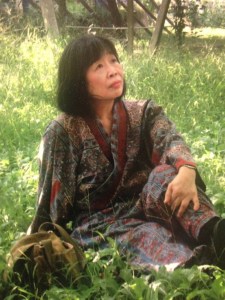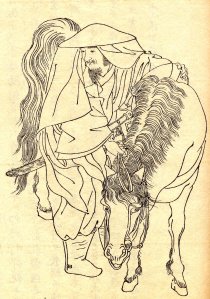
Japanese
10th century
If I were only sure
I could live as long as I wanted to,
I would not have to weep
at parting from you.

If I were only sure
I could live as long as I wanted to,
I would not have to weep
at parting from you.
We present this work in honor of Greenery Day.

When spring escapes
freed from being huddled in winter’s sleep,
the birds that had been stilled
burst into song.
The buds that had been hidden
burst into flower.
The mountains are so thickly forested
that we cannot reach the flowers
and the flowers are so tangled with vines
that we cannot pick them.
When the maple leaves turn scarlet
on the autumn hills,
it is easy to gather them
and enjoy them.
We sigh over the green leaves
but leave them as they are.
That is my only regret–
so I prefer the autumn hills.
We present this work in honor of the Japanese holiday, Constitution Memorial Day.

Finally after half a century, a clearly observable law has been found:
For mankind, all matters proceed
Along geometric lines
(If you put one grain of rice on the first intersection of a game board, two grains of rice on the second, four grains of rice on the third, and continue along these lines, what vast quantities will you have by the time the board is covered? When the ancient king was told the answer, how surprised he was…)
By the time I realized what was happening, I was clinging to the earth
So I would not be shaken off as it spun with ever greater speed
My hair, dyed in two parts with night and day, had come loose
(Yet still I toyed with dice in one hand)
As it turns, it is stripped page by page like a calendar pad growing thin
A cabbage growing small, shorn of leaves before our eyes
Once, this planet had plenty of moisture
(But that was in the days when those things that now belong to dead languages –
Things such as dawn, looks, and smiles – were still portents of things to come)
That’s right, for mankind, all matters proceed along geometric lines
Four and a half more centuries into the future
The shriveled brain that revolves
Rattling in the cranium’s hollow will grow still
Like the pale eye of a hurricane
All will see its resolution in those moments
As the rolling dice tumble, turning up their black eyes
Then finally coming to a halt
We present this work in honor of Showa Day.

deep beneath the sea
upon those in deepest sleep
cherry blossom petals fall
We present this work in honor of National Foundation Day.

Hollow night,
Earth holds its breath hushed
and watches me blossom.
With roots so straight,
The flowers will not cease to bloom.
In a state of ignorance as to the why of arrival,
they bid you welcome.
Hearts singing out to the springtime.
Could the news have been true?
That I’d become colorful.
That on sturdy heels
I’d set out to walk
This fragrant terrain of blankness.
Was it true to the core?
In this wind-vanished now,
No one’s seen the face of spring unpainted.
As we stand erect, through our eyes
the pale flow of petals.
Applauding hands, I wrench them open,
To blow your name inside.
Your birth,
Your awakening—cause for celebration.
Let us love what enters our vision,
With such wicked earnestness
I will dye you the color of spring—
Congratulations.
Sunrise dances lovely into my throat.
We present this work in honor of the Japanese holiday, Coming-of-Age Day.

In this world of ours
If only I can have fun
In the life to come
An insect or a bird
That’s what I’ll become!
We present this work in honor of the Japanese holiday, Labor Thanksgiving Day.

Fields of autumn,
When I see the flowers,
My heart, it feels like
It’s completely content, or maybe
It yearns to leave me forever.
We present this work in honor of the Japanese holiday, Culture Day.

When the tide is high
Flooding the rocky shore,
As the seaweed is he?
Seldom glimpsed, but
Much desired!

Autumn Moon
Fearing my past is exposed
to the moon,
I keep looking down
this evening.
We present this work in honor of the Japanese holiday, Mountain Day.

To speed my brother
Parting for Yamato,
In the deep of night I stood
Till wet with the dew of dawn.
The lonely autumn mountains
Are hard to pass over
Even when two go together-
How does my brother cross them all alone!